MARKET OVERVIEW
The Australia and New Zealand Immunoassay and Molecular Diagnostics market constitutes one significant part of the healthcare diagnostics industry in these two countries. Being an important aspect of disease diagnosis and monitoring, the market in this region efficiently provides patients with accurate and timely results using immunoassay and molecular diagnostic techniques advanced enough to provide sensitivity and specificity needed in patient care. Immunoassay diagnostics are the most commonly used to detect any specific proteins or hormones associated with diseases like infections, cancers, and metabolic conditions. On the other hand, molecular diagnostics involve detection of genetic material that offers a very precise method for identifying mutations in genetics, infectious diseases, and any kind of alteration at the DNA or RNA level.
Continued growth in demand for high-quality diagnostic solutions in Australia and New Zealand will be mainly attributed to the reliance by healthcare systems on cutting-edge technologies for improved patient outcomes. The shift towards personalized and precision medicine will increase the focus on the adoption of immunoassay and molecular diagnostics technologies in Australia and New Zealand. The region’s public and private healthcare providers will heavily focus on the improvement of early detection and treatment plans. These will be expected to be pushed by the availability and sophistication of diagnostic tools. Therefore, the market for tests in Australia and New Zealand Immunoassay and Molecular Diagnostics would be valuable in offering tests that would allow a healthcare professional to make decisions regarding patient care.
Under this, the immunoassay segment is likely to advance assays designed for more specific biomarker detection, supporting a range of therapeutic areas-from oncology to infectious diseases. The molecular diagnostics segment will see further incorporation of next-generation sequencing technologies, providing deeper genetic insight for the diagnosis of rare and complex diseases. Together, these technologies are going to enhance the diagnostic capabilities of the healthcare provider, contributing toward better clinical management.
Factors such as government policies and funding for health care research in Australia and New Zealand will determine the future of the Immunoassay and Molecular Diagnostics market. Both countries will undertake strategies for the improvement of their healthcare infrastructure through the development of innovation in diagnostics – as both are confronted with the problem of escalating chronic diseases and an aging population. In the future, the market will see strategic initiations concerning innovations of medical practices that will further advance the adoption of diagnostic technologies. Moreover, collaboration and cooperation between the public institutions, companies dealing with diagnosis, and research institutions will help promote environments for even more advanced techniques for diagnosing.
Australia and New Zealand also can expect that the regulatory framework surrounding diagnostic products is established and enhanced for their safety and efficacy. The approval of new diagnostic technologies by one will shape the future market landscape in fulfilling emerging health needs. In that regard, the best quality immunoassay and molecular diagnostics tools will be available and thus improve healthcare outcomes.
The healthcare diagnostics arena in the future will be a center point for Australia and New Zealand Immunoassay and Molecular Diagnostics market. Continual innovation with government support will enable the needs of healthcare demands to have ready-to-use diagnostic tools. The integration of immunoassay and molecular diagnostic technologies into mainstream clinical practice will have far-reaching implications in the way in which diagnosis, monitoring, and treatment of diseases take place in Australia and New Zealand.
Australia and New Zealand Immunoassay and Molecular Diagnostics market is estimated to reach $1363.0 Million by 2031; growing at a CAGR of 7.0% from 2024 to 2031.
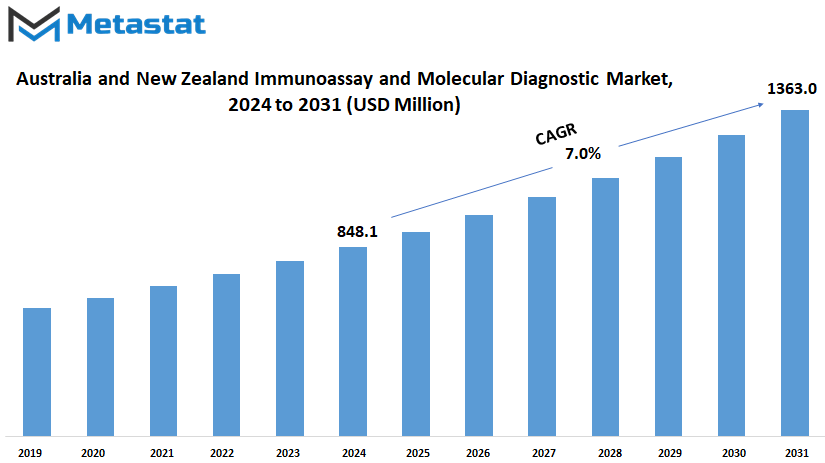
GROWTH FACTORS
The Australia and New Zealand Immunoassay and Molecular Diagnostics market is expected to grow steadily over the next few years, supported by several key factors, amongst which the prime one is increased demand for advanced diagnostic tools that can provide immediate results. As both countries progress in maintaining better healthcare services, the focus of diagnosis at an early stage is on diseases. Immunoassays and molecular diagnostics play an important role in the identification of conditions such as infectious diseases and cancer at early stages. The proper management of disease through early diagnosis benefits patients by yielding improved outcomes and diminishes health care costs.
An increased prevalence of chronic diseases such as diabetes and cardiovascular disorders has played a significant role in the expansion of the market. Such conditions necessitate regular follow-up, for which immunoassays present an invasive method to monitor the health status of patients. An aging population in Australia and New Zealand ensures a steady increase in the demand for diagnostic tests, thus propelling the market for immunoassays. But in addition, the need for continuous advances in molecular diagnostics will keep driving forward the market itself, such as more sensitive and specific tests.
However, the market has certain critical challenges. The foremost is that the advanced diagnostic technologies bring along a very high cost burden. Although these instruments have their benefits, they are priced enormously, which may, in turn, act as a financial burden on small healthcare centers and resource-poor patients. Besides, strict regulations in Australia and New Zealand may delay the entry of new diagnostic tools into the market, increasing the time lag to penetrate.
Despite these potential obstacles, however, the market for Australia and New Zealand Immunoassay and Molecular Diagnostics seems promising for growth over the next five years. The trend towards personalized medicine, where treatments are tailored to an individual’s genetic makeup, promises to enhance demand for molecular diagnostics. A future outlook with the trend of more personal healthcare approaches and steady technology advancement, the industry appears promising. Hence, investment in these technologies and companies can hope for quite some time in terms of increasing demand so that it becomes very attractive to invest in such regions for future development.
MARKET SEGMENTATION
By Type
With growth in the healthcare and technology sectors, the Australia and New Zealand Immunoassay and Molecular Diagnostics market is expected to grow in the future. Being on the forefront of diseases, both detection and prevention are becoming very important with the advancement of personalized medicine. Modern immunoassays, commonly employed in the detection of specific proteins or antibodies, are ever increasing with accuracy and speed. This growth is particularly being witnessed in areas involving infectious diseases and screening for cancer as well as hormone testing. With this flow of innovation, the role of immunoassays in the market will possibly stretch further, offering efficient and accessible testing options across a wide range of healthcare facilities.
It will be genetic material with analysis and diagnosis, and possibly disease prediction. Molecular diagnostics goes to the root causes of issues at a molecular level for more accurate diagnostics, especially important in the management of COVID-19 and various viral infections. Molecular diagnostics is likely to increasingly become essential, not only for infectious diseases but also for conditions such as cancers and genetic disorders in the next few years. When research is pushed forward and we gain an understanding of human genetics, molecular diagnostics may possibly be a very essential component in the near future of personalized medicine-researching treatments that find out an individual’s own genetic makeup.
Presently, immunoassays and molecular diagnostics are contributing to changing the course of healthcare outcomes in Australia and New Zealand. With more people seeking quality healthcare services, combined with rising chronic disease prevalence globally, there is a growing demand for better diagnostic equipment. Both countries’ governments and healthcare providers will thus be likely to commit additional resources to these technologies in order to better the handling of all public health challenges. In return, patients would be diagnosed appropriately with minimal delays and inaccuracies in the diagnoses for better management of diseases.
Going forward, the demand for diagnostics in Australia and New Zealand is expected to grow to the point that they’ll follow the whole technological advance. Also, future advantages can be seen in artificial intelligence and machine learning being integrated into these diagnostic tools. The well-being of patients will, not only be improved, but also the health care systems; hence, this market’s future should hold great promise toward improving the general healthcare landscape in both nations and helping to satisfy the growing demand for more sophisticated and reliable diagnostic solutions.
By Application
The Australia and New Zealand Immunoassay and Molecular Diagnostics market is slated to grow ahead in the years to come, owing to advance medical technologies and ever-increasing health care demands. Immunoassays and molecular diagnostics have become tools for the diagnosis and management of several health conditions. These techniques provide precise, rapid, and reliable results and are thus valuable in a clinical environment. As the population ages and chronic diseases prevail, the demand for these diagnostic tools will continue expanding across Australia and New Zealand.
Infectious diseases will remain at the forefront of this market because pandemics and other health crises are perennial. Pathogen detection is critical to public health initiatives, so identifying pathogens quickly and accurately can be done with immunoassay and molecular diagnostics, thereby providing timely interventions and treatments. As new diseases emerge, these markets will become relevant, leading to an increased demand for advanced diagnostic technologies.
Oncology is yet another area where these technologies are advancing. The intensified knowledge of cancer biology has paved the way for highly advanced diagnostic procedures that lead to early detections and individualized treatments. Immunoassays and molecular diagnostics, respectively, inform the physician about tumor markers and genetic mutations, making possible treatment plans that tackle the disease in a personalized fashion. Such treatments not only enhance outcomes but also bypass side effects associated with more generalized therapies.
Similar increases in cardiology will also be expected in diagnostics. Heart disease is a leading cause of death, and early detection is the basis for reducing death. These tools of diagnosis will offer non-invasive means of assessing the potential menace of myocardial conditions toward patients and can be intervened very early as well. The demand for these technologies will go up in line with the shift of the healthcare market toward preventive health care.
The industry holds great significance in the areas of autoimmune diseases and endocrinology. Immunoassays facilitate the detection of specific antibodies that mark autoimmunity, and molecular diagnostics are providing insight into hormonal imbalances and other related disorders. Blood screening and prenatal testing will also take advantage of this advancement as this will provide safer and more accurate diagnostic alternatives.
In the future, it will be the central point of the Australia and New Zealand Immunoassay and Molecular Diagnostics market. Personalized medicine will be a product that promotes innovation, a change in patient outcomes, and enhanced healthcare based on individual genetic profiles.
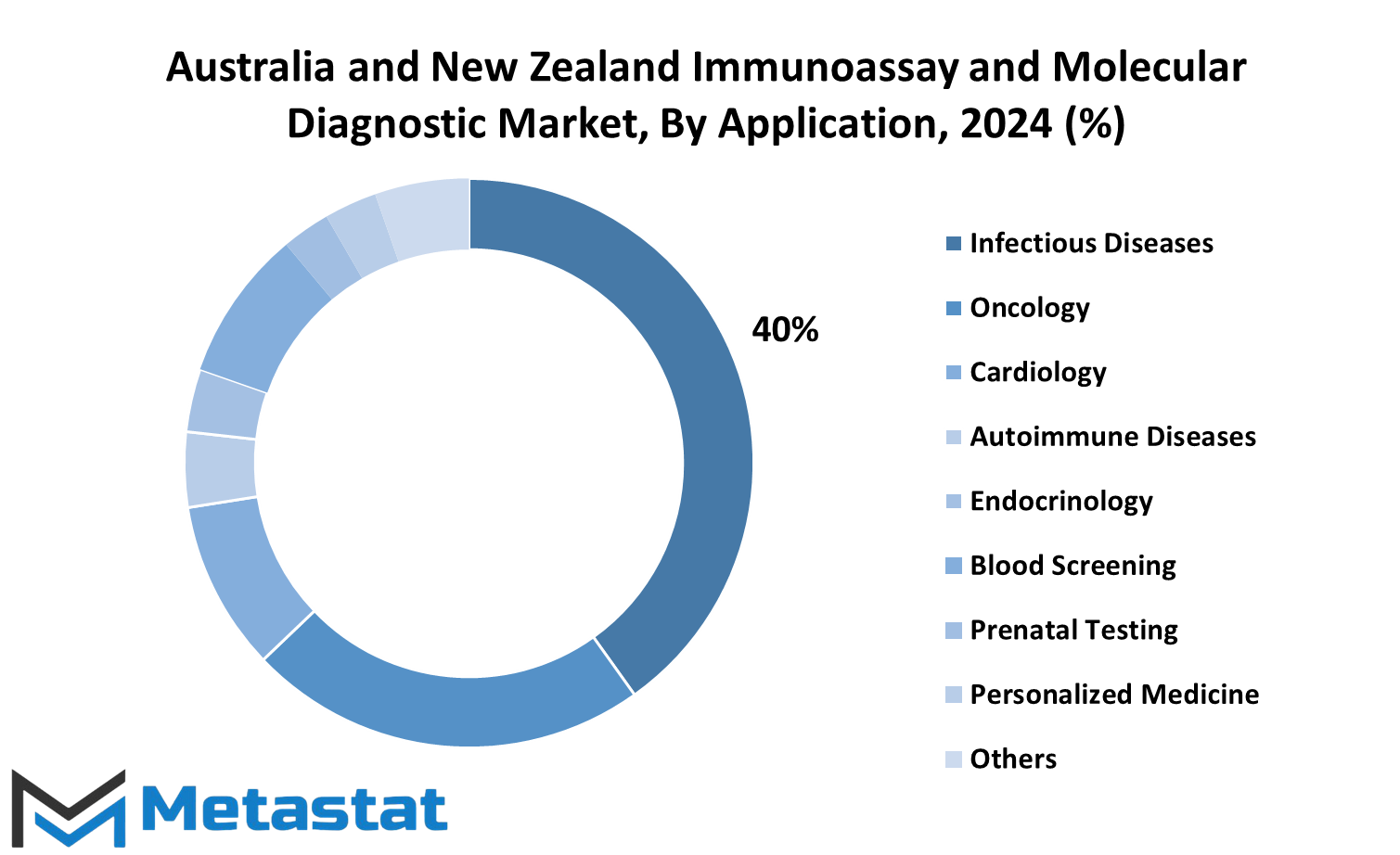
By End User
The Australia and New Zealand Immunoassay and Molecular Diagnostics market is slated to grow ahead in the years to come, owing to advance medical technologies and ever-increasing health care demands. Immunoassays and molecular diagnostics have become tools for the diagnosis and management of several health conditions. These techniques provide precise, rapid, and reliable results and are thus valuable in a clinical environment. As the population ages and chronic diseases prevail, the demand for these diagnostic tools will continue expanding across Australia and New Zealand.
Infectious diseases will remain at the forefront of this market because pandemics and other health crises are perennial. Pathogen detection is critical to public health initiatives, so identifying pathogens quickly and accurately can be done with immunoassay and molecular diagnostics, thereby providing timely interventions and treatments. As new diseases emerge, these markets will become relevant, leading to an increased demand for advanced diagnostic technologies.
Oncology is yet another area where these technologies are advancing. The intensified knowledge of cancer biology has paved the way for highly advanced diagnostic procedures that lead to early detections and individualized treatments. Immunoassays and molecular diagnostics, respectively, inform the physician about tumor markers and genetic mutations, making possible treatment plans that tackle the disease in a personalized fashion. Such treatments not only enhance outcomes but also bypass side effects associated with more generalized therapies.
Similar increases in cardiology will also be expected in diagnostics. Heart disease is a leading cause of death, and early detection is the basis for reducing death. These tools of diagnosis will offer non-invasive means of assessing the potential menace of myocardial conditions toward patients and can be intervened very early as well. The demand for these technologies will go up in line with the shift of the healthcare market toward preventive health care.
The industry holds great significance in the areas of autoimmune diseases and endocrinology. Immunoassays facilitate the detection of specific antibodies that mark autoimmunity, and molecular diagnostics are providing insight into hormonal imbalances and other related disorders. Blood screening and prenatal testing will also take advantage of this advancement as this will provide safer and more accurate diagnostic alternatives.
In the future, it will be the central point of the Australia and New Zealand Immunoassay and Molecular Diagnostics market. Personalized medicine will be a product that promotes innovation, a change in patient outcomes, and enhanced healthcare based on individual genetic profiles.
|
Report Coverage |
Details |
|
Forecast Period |
2024-2031 |
|
Market Size in 2024 |
$848.1 million |
|
Market Size by 2031 |
$1363.0 Million |
|
Growth Rate from 2024 to 2031 |
7.0% |
|
Base Year |
2022 |
|
Regions Covered |
North America, Europe, Asia-Pacific Green, South America, Middle East & Africa |
COMPETITIVE PLAYERS
Immunoassay and Molecular Diagnostics Market: A formidable market in Australia and New Zealand is expected to grow with enormous potential by advanced healthcare and demand for precision medicine. It has a number of key players who shape the future through innovation and competition. Some of the companies included are Abbott Laboratories, Agilent Technologies, Becton, Dickinson and Company (BD), bioMérieux SA, Bio-Rad Laboratories, and Charles River Laboratories. Other names include DiaSorin S.p.A, F. Hoffmann-La Roche, Hologic, Illumina, Siemens Healthineers, Sysmex, Thermo Fisher Scientific, and QIAGEN.
The companies are now trying to find solutions on making diagnostics more accurate and better. This is an important aspect in future healthcare systems. Companies invest in heavy research and development in its areas. The demand for more personalized treatments by all means has increased, and companies have to cater to them. Such treatments have great promise in molecular diagnostics and are in huge demand, especially in Australia and New Zealand. Molecular diagnostics are promising areas that are gaining popularity because they can detect diseases at an early stage and offer tailored treatments in search of better patient outcomes. Advances with regard to the technologies of immunoassay, which allows the detection of specific biomarkers in biological samples, will continue to advance, thus providing more sensitive and rapid tests.
Innovation shall continue to do the trick in the competitive landscape as the Immunoassay and Molecular Diagnostics market in Australia and New Zealand would continue to advance. Building momentum through automation and digital applications, many firms now look into what AI and machine learning can do to improve diagnostic procedures. Using AI would also aid in making diagnostics easier for the healthcare providers to interpret complex data. Thus, it would further lead to speedy and accurate diagnoses.
As the stakes of health issues continue growing with the rise in chronic diseases, firms in this business will need to be nimble. Strategic partnerships and acquisitions and collaborations between these leading players will be the norm, as firms position themselves for better market positions. Governments, now in Australia and New Zealand, might prove to be the game-changers in the future direction of this market as they continue to focus on innovations that will improve the public health sphere.
Australia and New Zealand Immunoassay and Molecular Diagnostics market will experience significant growth in the coming years. In fact, both markets will continue to evolve, with the leading players keeping both nations at the forefront of medical diagnostics, thus indirectly helping patients and other healthcare systems.
Australia and New Zealand Immunoassay and Molecular Diagnostics Market Key Segments:
By Type
- Immunoassay
- Molecular Diagnostics
By Application
- Infectious Diseases
- Oncology
- Cardiology
- Autoimmune Diseases
- Endocrinology
- Blood Screening
- Prenatal Testing
- Personalized Medicine
- Others
By End User
- Hospitals and Clinics
- Diagnostic Laboratories
- Others
Key Australia and New Zealand Immunoassay and Molecular Diagnostics Industry Players
- Abbott Laboratories
- Agilent Technologies, Inc.
- Becton, Dickinson, and Company (BD)
- bioMérieux SA
- Bio-Rad Laboratories, Inc
- Charles River Laboratories
- DiaSorin S.p.A.
- F. Hoffmann-La Roche Ltd.
- Hologic, Inc.
- Illumina, Inc.
- Siemens Healthineers AG
- Sysmex Corp.
- Thermo Fisher Scientific Inc.
- QIAGEN N.V.
WHAT REPORT PROVIDES
- Full in-depth analysis of the parent Industry
- Important changes in market and its dynamics
- Segmentation details of the market
- Former, on-going, and projected market analysis in terms of volume and value
- Assessment of niche industry developments
- Market share analysis
- Key strategies of major players
- Emerging segments and regional growth potential



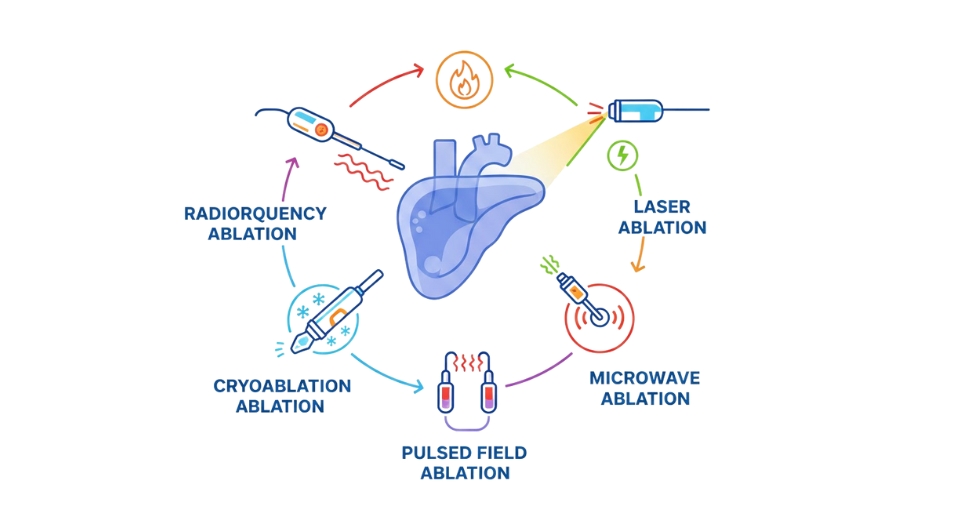

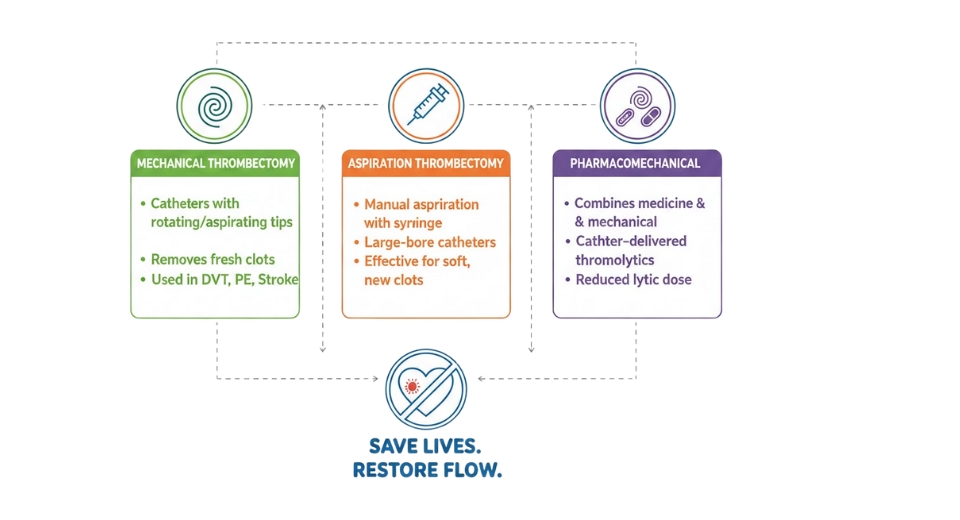
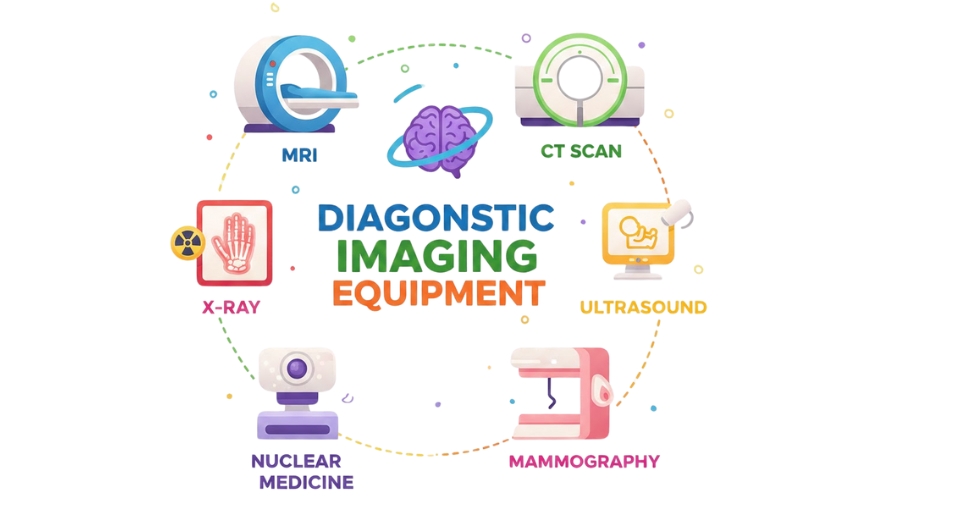

 US: +1-(714)-364-8383
US: +1-(714)-364-8383






